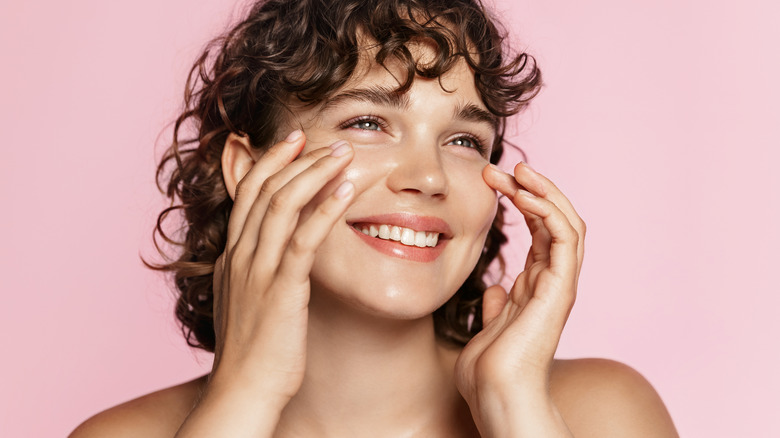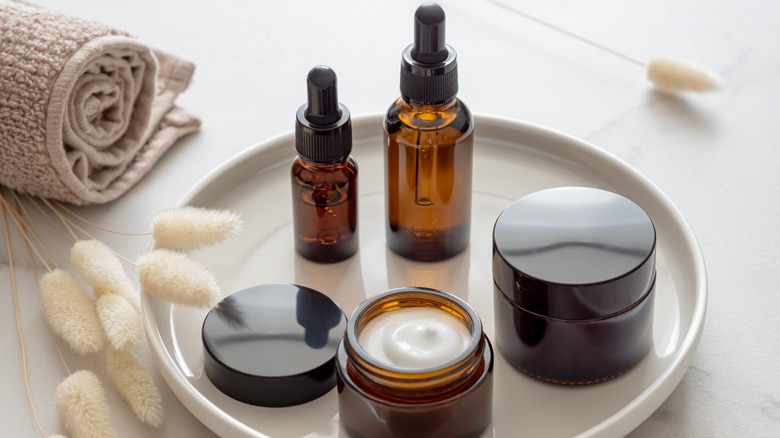Everything You Need To Know About Retinyl Palmitate
We may receive a commission on purchases made from links.
In the high-stakes world of skincare, there are many benefits, products, and side effects to navigate. We depend on dermatologists, brand marketing, and the vanities of influencers to simplify this increasingly complex world — a world that has become more about clear skin and less about makeup in the last few years. But within the hierarchy of ingredients and combinations, one power couple has stood out: Retinol serums and SPF.
Retinol is a chemical derivative of vitamin A that is known to reduce the appearance of wrinkles, treat acne, increase the production of collagen, and make your skin glow overall. "Retinoids and retinols change how a cell functions, specifically the speed at which a cell turns over, or divides, to create new cells," dermatologist Zakia Rahman told Stanford Medicine. "[Retinoids] thicken the epidermis through increased cell proliferation at the top level. They increase the production of natural chemicals (such as hyaluronic acid) in your skin that keep it plump and moist. They stimulate collagen production and inhibit the breakdown of collagen that already exists. They also block several inflammatory pathways that exacerbate pimples and acne," Rahman continued.
However, using retinol everyday can be harsh on the skin by increasing inflammation or photosensitivity to UV rays (via Healthline). That's where regular SPF comes in, but if you're someone with super sensitive skin, you may want to check out retinyl palmitate.
Retinyl palmitate is gentler than other retinoids
Retinoids are a class of vitamin A derivatives, and there are many kinds of them that you'll find in skincare products. Retinols are usually the over-the-counter options that are marketed to most shoppers at Sephora, while Retinaldehydes are slightly stronger versions that you can still get without a prescription (via Healthline). The Drunk Elephant A-Passioni Retinol Cream ($74) is a good example of the former, while Avène's RetinAL ($52) is of the latter. Retinoids like Tretinoin and Tazarotene are super potent, and you'll definitely need to check with your dermatologist to get your hands on these.
All of these may 'purge' your skin initially, where you may see increased flare-ups or irritated and inflamed skin. "It's not that the retinol is making you break out more—it just brings pimples that a brewing below the surface to the surface all at once," board-certified dermatologist Morgan Rabach told Well+Good. However, if this purge lasts longer than a week or two, your skin may be too sensitive to handle regular retinol.
That's where retinyl palmitate comes in. As the most gentle version of retinol, many prefer to start with this ingredient and work their way up. According to The Derm Review, retinyl palmitate takes longer to convert to retinoic acid in the body than retinol, which is what makes its effects less harsh. Although it might take longer to see its benefits, retinyl palmitate still packs an anti-aging punch.
Retinyl palmitate might take longer to work
Retinyl palmitate is the best option for anyone with sensitive skin. It offers the same benefits as all the other retinoids but more gently, per Byrdie. It speeds up cell turnover, which makes way for new cells and brighter skin, stimulates the production of collagen in the body, and neutralizes free radicals, which further helps in reducing fine lines and wrinkles. However, because retinyl palmitate goes through a longer conversion process — into retinoic acid — than other retinoids, you won't see the effects as quickly either. So, if you're someone who likes to see results immediately, retinyl palmitate may test you.
And although retinyl palmitate is weaker than the others, it's still a retinoid. It exfoliates your skin and increases photosensitivity. You can expect similar side effects when you first start using it — skin irritation, peeling, etc. — and it's important to consult with your provider before you introduce it to your routine. Make sure you patch-test it and follow up with a thick moisturizer. Some love to make a 'retinol sandwich,' where you moisturize your skin before and after adding retinol (via Popsugar). Other things to note are: never mix your retinols with vitamin C, benzoyl peroxide, and AHA/BHA acids. These are either going to neutralize the effects of your retinol or further irritate your skin.
If you're feeling confident about bringing retinyl palmitate home, the Derm-A cream ($14.36) is huge on Amazon, while Shani Darden's Retinol Reform ($88) is a reliable cult classic.


